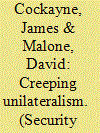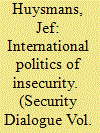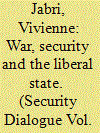|
|
|
Sort Order |
|
|
|
Items / Page
|
|
|
|
|
|
|
| Srl | Item |
| 1 |
ID:
071595


|
|
|
|
|
| Publication |
2006.
|
| Summary/Abstract |
In this article, it is argued that the genesis of the Iraq Crisis of 2003 within the Security Council can be traced to earlier patterns of acquiescence by Council members in US and UK unilateral enforcement action in Iraq. By the time this acquiescence ceased, between 1994 and 1996, UK and US enforcement policy was set and would culminate in Operation Iraqi Freedom in March 2003.
|
|
|
|
|
|
|
|
|
|
|
|
|
|
|
|
| 2 |
ID:
071590


|
|
|
|
|
| Publication |
2006.
|
| Summary/Abstract |
This article seeks (a) to show the complexities of the concept of exception in international politics, (b) to suggest that the current politics of insecurity are not limited to a clash over the status and limits of normativity in international politics, and (c) to introduce conceptual groundwork for theorizing international politics of insecurity as a contest of the exception. By combining normative and existential concepts of exception, a conceptual matrix is introduced that distinguishes between political liberalism and realism, on the one hand, and anti-diplomatic ultrapolitical realism and liberalism, on the other. While the focus in discussions of exception is often on the tension between realist assertions of the limited validity of international norms and liberal assertions of the real capacity of international norms to constrain political power, something more complex may be going on in current international politics of insecurity. The conceptual matrix draws attention to an additional tension between those realists and liberals willing to retain common grounds for symbolic mediation in international politics and those seeking to intensify antidiplomatic inwardness.
|
|
|
|
|
|
|
|
|
|
|
|
|
|
|
|
| 3 |
ID:
071592


|
|
|
|
|
| Publication |
2006.
|
| Summary/Abstract |
Recent literatures have become sceptical about the concept of an international, preferring to make claims about new forms of imperial or exceptional politics. This article examines the relation between these three concepts as conventionally understood within discourses of internationalism; expresses scepticism about the use of the term 'imperial' for capturing what is at stake in challenges to international order; and seeks to clarify what is at stake in contemporary practices of exceptionalism. Where exceptions were conventionally declared at the limits of the sovereign state, qualified by the ordering capacities of a system of sovereign states, enabled by a theory of history marking the modernity of sovereign authorities and inhibited by resistance to imperial and theological order, exceptions are now enacted in ways that exceed official cartographies of sovereign authorization. Consequently, traditions and debates about what it means to secure the modern subject that have largely reproduced options laid out by Carl Schmitt and Hans Kelsen in the 1920s and 1930s must become engaged with questions about the limits of specifically modern forms of political life. If exceptions are not being made where they are supposed to be made, subjects will not be secured where they are supposed to be secured.
|
|
|
|
|
|
|
|
|
|
|
|
|
|
|
|
| 4 |
ID:
071593


|
|
|
|
|
| Publication |
2006.
|
| Summary/Abstract |
While gender-based violence has recently emerged as a salient topic in the human security community, it has been framed principally with respect to violence against women and girls, particularly sexual violence. In this article, I argue that gender-based violence against men (including sexual violence, forced conscription, and sex-selective massacre) must be recognized as such, condemned, and addressed by civilian protection agencies and proponents of a 'human security' agenda in international relations. Men deserve protection against these abuses in their own right; moreover, addressing gender-based violence against women and girls in conflict situations is inseparable from addressing the forms of violence to which civilian men are specifically vulnerable.
|
|
|
|
|
|
|
|
|
|
|
|
|
|
|
|
| 5 |
ID:
071591


|
|
|
|
|
| Publication |
2006.
|
| Summary/Abstract |
War in late modern politics is a technology of control. While its violent manifestations - for example, the invasion and occupation of Iraq - are directly felt by the population targeted, the practices associated with that war and the wider so-called war against terrorism have a far wider span of operations that encompasses spaces across the globe. This article provides an understanding of global war as a distinctly late modern form of control. It shows that the practices constitutive of global war are best understood in terms of a matrix, incorporating states and their bureaucracies, as well as non-state agents, and targeting at once states, particular communities and individuals. The matrix of war operates in the name of humanity; however, it is ultimately this humanity as a whole that comes to be the subject of its operations of global control. The implications, as the article argues, are monumental for democratic government and the spaces available for scrutiny and dissent.
|
|
|
|
|
|
|
|
|
|
|
|
|
|
|
|
| 6 |
ID:
071594


|
|
|
|
|
| Publication |
2006.
|
| Summary/Abstract |
Posing the question of whether the European Union is likely to develop a strategic culture, this article discusses the concept of human security as the possible basis for a novel type of such a culture. It argues that there are incentives for governments to 'pool' sovereignty in the security and defence field on the logic of two-level games, while noting that EU institutions themselves are developing both political and military capacities at present. The sensitive issue of developing a strategic culture for coercive diplomacy and the consequent use of force is not progressing. However, the ideological basis for a post-national strategic culture based on human security provides a window of opportunity for the EU.
|
|
|
|
|
|
|
|
|
|
|
|
|
|
|
|
|
|
|
|
|